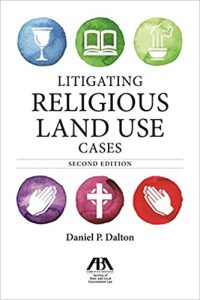
What it Takes to Find Municipalities Liable Under § 1983
Although 42 U.S.C. § 1983 (commonly known as “§ 1983”) is one of the most potent tools that a plaintiff has for the enforcement of


Although 42 U.S.C. § 1983 (commonly known as “§ 1983”) is one of the most potent tools that a plaintiff has for the enforcement of

Twenty-four years ago, the Religious Land Use and Institutionalized Persons Act (RLUIPA) was signed into law, marking a significant milestone in protecting religious liberty in

Good afternoon. Thank you for inviting me to speak with you today. I have been asked to provide my remarks outlining the laws Congress passed

On its face, land use law is sometimes straight forward. Landowners, businesses, and other entities are permitted to use land one way, but not another

The Religious Land Use and Institutionalized Persons Act (RLUIPA) provides vital protections for religious institutions facing discriminatory or unduly burdensome land use regulations. But what happens if a religious institution believes its RLUIPA rights have been violated? What kind of relief can they seek? In this blog post, we’ll explore the various remedies available to those who successfully bring a RLUIPA land use claim.

The Atlantic Magazine profiled the case of North Jersey Vineyard v. City of South Hackensack, New Jersey, a case that I litigated where the Court applied the Religious Land Use and Institutionalized Persons Act (RLUIPA), to an land use decision of a local community that barred a church from using a building it purchased in an area zoned for religious use, that ultimately resulted in a difficult years long lawsuit.

This provision of RLUIPA, often referred to as the “non-discrimination provision,” serves as a shield against unfair treatment of religious organizations in the context of land use. It prohibits governments at all levels—federal, state, and local—from enacting or enforcing regulations that single out religious assemblies or institutions based on their faith or denominatio

The right to freely exercise one’s religion is a cornerstone of American society. However, navigating the complexities of land use regulations can sometimes create hurdles for religious institutions seeking to establish or expand their presence. The Religious Land Use and Institutionalized Persons Act (RLUIPA) aims to address this by ensuring a level playing field. Here, we delve into the act’s Equal Terms Provision and its application in land-use matters.

The Religious Land Use and Institutionalized Persons Act (RLUIPA) protects the right of religious organizations to practice their faith without undue government interference. A key concept within RLUIPA is the idea of a “substantial burden” on religious exercise. This blog post unpacks what this term means and how it impacts religious institutions and land-use regulations.

The Religious Land Use and Institutionalized Persons Act, also known as RLUIPA, passed by a unanimous Congress and signed into law by President Clinton in 2000, was enacted by Congress in response to actions taken by local government to exclude houses of worship within communities. All types of religious uses, like Churches, Mosque, Temples and Synagogues faced discrimination in building on land in communities throughout the United States and as a result, Congress stepped in to address municipal discrimination
Problem Solvers for Religious and Nonprofit Organizations, Property Owners, and Businesses.
Do you have a question? We would love to hear from you. Click the button below and we’ll get in touch with you shortly.
Please note that this website may be considered attorney advertising in some states. Prior results described on this site do not guarantee similar outcomes in future cases or transactions.